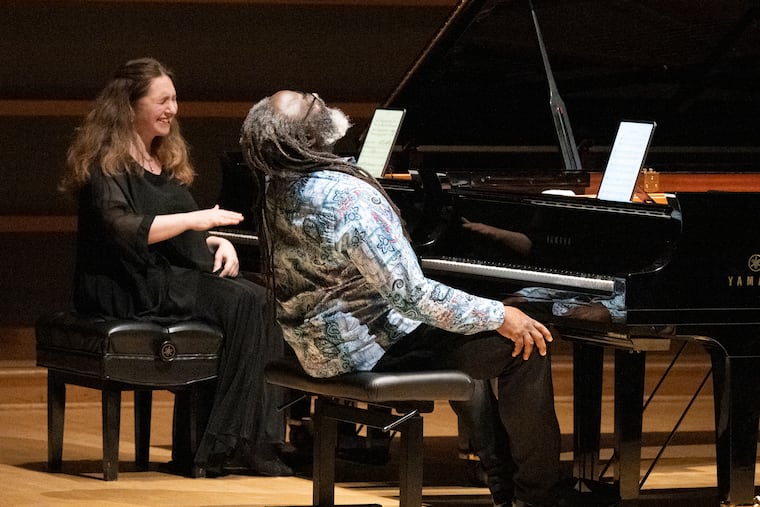Awadagin Pratt and Simone Dinnerstein’s piano recital at the Philadelphia Chamber Music Society was a fine balance of contrasts
The program was part of the Elaine Kligerman Piano Series that runs through May.

On Wednesday evening, pianists Awadagin Pratt and Simone Dinnerstein took the stage at Perelman Theater for a recital that found balance and symmetry among worlds of contrast.
This was true of the artists’ artful programming, which paired minimalist sound worlds with the virtuosity of Mozart and Beethoven, and of the distinct voices of the pianists. The Philadelphia Chamber Music Society program was divided evenly between the pianists, each half opening with a shorter work for solo piano that flowed seamlessly into a meatier two-piano duet.
Pratt began the evening with the Latvian composer Peteris Vasks’ Castillo interior (“Interior Castle”), an expansive meditation on the writings of the Spanish medieval mystic Teresa de Ávila, which Pratt recorded for his 2023 album STILLPOINT.
The approximately 12-minute piece dramatizes that terrifying chasm between the still peace of meditative contemplation and the frenzied, even desperate, turmoil of doubt: passages of steady, almost simple, chorale-like writing alternate with the obsessive churn of minimalist sixteenth-notes.
As the Castillo interior progresses, however, the minimalist incursions become shorter, and the minor mode of the chorale transcends to a beatific major, a beam of golden light in what was once the dark interior of a castle.
In this performance of the Vasks, Pratt’s playing fittingly possessed a translucent lyricism that evoked the clarity of church bells. The final tones of the D major chord having melted into the air, Dinnerstein joined Pratt to break through the silence with the bombastic opening chords of Mozart’s Sonata for Two Pianos in D Major, K. 448.
Throughout this sonata — Mozart’s only work for four hands and two pianos — one could imagine the twinkle in Mozart’s eye as he passes melodic material from one pianist to the other, though that certain litheness that allows such moments of brilliant passage work to shine did not always come through in the performance. This might in part have been due to the particularly tinny upper register of the Yamaha pianos on stage.
Following an intermission extended slightly by tuning needs, the pair switched seats, and Dinnerstein opened her half of the program with a virtuosic rendition of Philip Glass’ Piano Etude No. 6.
Ending without resolution, on the precipice of resolving back to F (minor), this provided a perfect transition — which even prompted a gentle laugh from the audience — into the arcadian world of Beethoven’s Symphony No. 6, arranged for two pianos by German composer, organist, and music journalist Selmar Bagge.
This highly virtuosic transcription then put the trills and repeated notes of Glass’ Etude immediately to work, as the pianists were forced to evoke the breadth of Beethoven’s orchestra with the (comparatively) dull hammer action of the piano.
Here, Dinnerstein and Pratt evoked the delights of the pastoral landscape effectively, particularly in the symphony’s “Szene am Bach” (“scene at the stream”), a gently lilting movement that was all calm. A thrilling thunderstorm followed, after which the clouds parted for Dinnerstein’s exquisite rendition of the symphony’s final “shepherd’s song.”
After much appreciative applause from the theater’s full house, Pratt and Dinnerstein returned to the stage to share one last transcription for the evening: sitting together on one stool, the pair performed György Kurtág’s transcendent four-hand arrangement of the opening sonatina of Bach’s cantata Gottes Zeit ist die allerbeste Zeit, BWV 106, “Actus tragicus.”
Following the dramatic contrasts of style and emotional arc that shaped the program, the intimate interweaving of hands required of this sonatina seemed to close the program symbolically, articulating the union of voices through the careful choreography, and balance, of four hands.
Pratt and Dinnerstein’s program was featured as part of the Chamber Music Society’s Elaine Kligerman Piano Series, which will sponsor four further concerts in the coming months, with programs from the likes of Richard Goode, Leif Ove Andsnes, Mitsuko Uchida, and another two-piano recital featuring an all-Ravel program by Lydia Artymiw and Cynthia Raim.